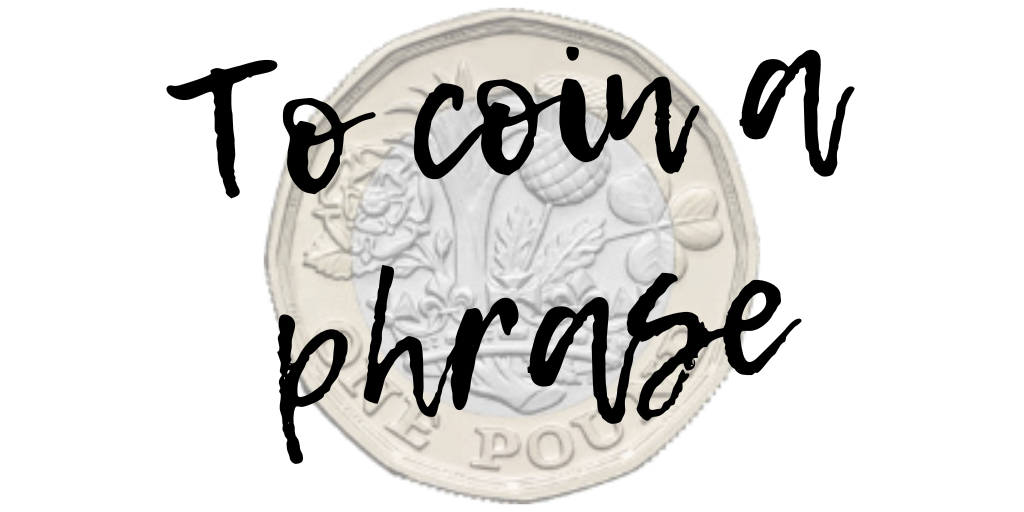The idiom “to coin a phrase” can be used when you are punning or using a cliché or slang expression to demonstrate that you are aware that those you’re addressing think it’s a silly thing to say but realise at the same time that it’s relevant. In that sense it has a humorous tone.
The phrase is also used to introduce a new or unusual expression. It is often used, again in a humorous or ironic way, to suggest that the speaker is aware of the novelty of their expression. For example, someone might say “To coin a phrase, life is a journey” to suggest that they are about to offer a profound or insightful observation about life.
The origin of the idiom, “to coin a phrase”
The phrase “to coin a phrase” is thought to have originated in the 14th century, when the verb “to coin” meant to create or invent something. In the 16th century, the phrase began to be used more specifically to refer to the creation of new words or phrases. It is believed to be a variation of the phrase “to invent a word,” which was used in the 15th century. The idiom “to coin a phrase” means to create a new expression or saying. It is often used when someone uses a unique or unusual way of saying something. The first recorded use of the idiom was in 1548, in a book by the English writer Thomas Elyot. In his book, Elyot wrote the following:
“To coin a new phrase, I will call him a natural philosopher.”
In this passage, Elyot is using the idiom “to coin a phrase” to introduce a new term, “natural philosopher.” This term was used to describe someone who studied the natural world. Elyot’s use of the idiom “to coin a phrase” is significant because it is the first recorded use of the phrase in English. The idiom has since become a common way to describe someone who creates a new expression or saying.
The book in which Elyot used the idiom “to coin a phrase” is called The Dictionary of Syr Thomas Eliot Knyght. The book is a dictionary of English words and phrases, and it is one of the first English dictionaries ever published. Elyot was a scholar and diplomat, and he was interested in improving the English language. He believed that the English language needed to be updated with new words and phrases to keep up with the changing world. The Dictionary of Syr Thomas Eliot Knyght was an important step in the development of the English language, and it helped to make the idiom “to coin a phrase” a part of the English language.
Another early use of the phrase “to coin a phrase” is in the 1589 book The Arte of English Poesie by George Puttenham. In the book, Puttenham uses the phrase to describe the process of creating new words or phrases:
“And as the goldsmith doth with his hammer beat out the new coined piece, so must the poet with his pen beat out his new coined word”
and
“to coine a phrase, is to forge or make new wordes, or to alter the olde, by composition or derivation, or by cutting off, or adding to.”
The book is a treatise on English poetry and rhetoric. It is one of the most important works on English literature from the Elizabethan era
The phrase “to coin a phrase” became more popular in the 18th century, used more literally. It was used to describe someone who had invented a new word or phrase. However, over time, the meaning of the idiom broadened. It came to be used to describe anyone who used a new or unusual expression, even if they had not invented it.
Using “to coin a phrase”
The phrase “to coin a phrase” is often used to create humour. For example, someone might say “to coin a phrase” before using a common or overused expression. The phrase can also be used in a more serious way, to emphasize the novelty or importance of a new idea
Here are some examples of how the idiom “to coin a phrase” can be used in a sentence:
- “That was a very bad idea! To coin a phrase!”
- “I’m not sure if I’m the first person to say this, but I think we need to coin a new phrase for that.”
- “That’s a great way to put it! To coin a phrase, you’ve hit the nail on the head.”

To coin a phrase
In conclusion
The idiom “to coin a phrase” is a reminder that language is constantly evolving. New words and phrases are being created all the time, and the meaning of existing words and phrases is constantly changing. This is one of the things that makes language so interesting and dynamic.




Leave a Reply
Want to join the discussion?Feel free to contribute!